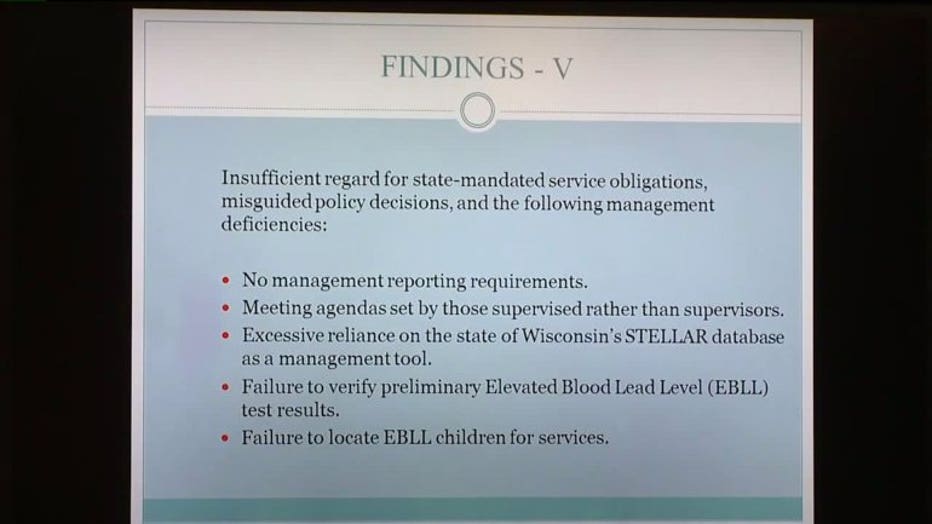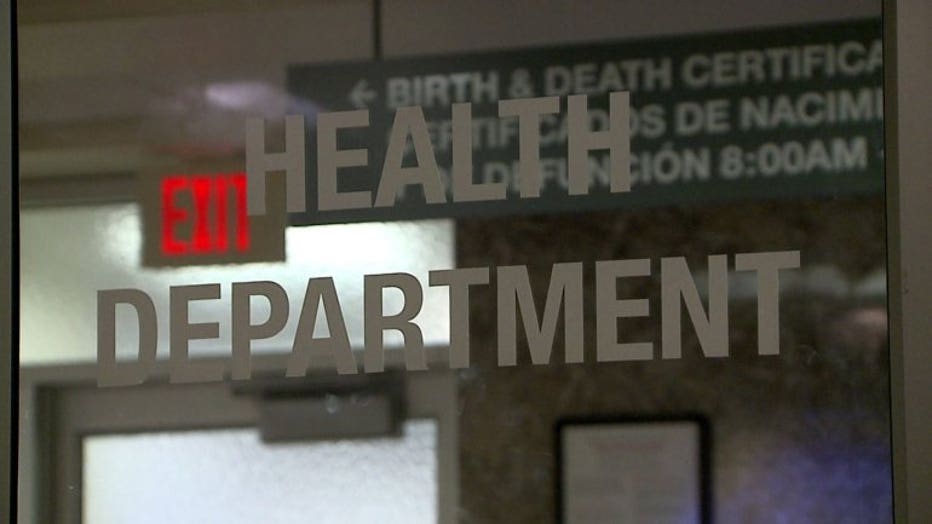Milwaukee's top health official: Lead problems are just 'the canary in the mine'
MHD failed to use enforcement powers to protect children from lead
MHD failed to use enforcement powers to protect children from lead
MILWAUKEE -- Milwaukee's troubled health department "consistently failed" to use its enforcement powers to protect children from lead, said a city investigator who detailed his findings to Common Council members Tuesday.
That was only the start of the revelations. The department's interim leader said the federal government told Milwaukee about its concerns in 2012, and she said the lead abatement issues are merely a "canary in the mine" in an agency that suffers from racial animosity.
"Just what the hell was going on in that health department for the last five years?" wondered Alderman Bob Donovan, one of several members to voice concerns over the issues that surfaced at Tuesday's Steering and Rules committee meeting.



In 2017, health inspectors issued just one citation against a property owner who failed to comply with lead abatement orders, a Legislative Reference Bureau investigation found. That number plummeted from 46 citations two years earlier, said Aaron Cadle, the LRB's analyst.

Aaron Cadle
The number of lead abatement orders fell from 77 in 2015 to 34 in 2017 even though the number of properties that required attention did not decrease, Cadle said.
"There's a lot of frustrating statistics that we're looking at," said Alderwoman Chantia Lewis.
Tuesday's revelations add to the damning findings against the health department in Mayor Tom Barrett's administration. But council members grew frustrated at how much information Cadle was not able to provide.
"There are various reasons I couldn’t get the information," Cadle said at one point, explaining that the health department's bookkeeping was so bad it was "not possible" to find some data.
"We have nothing!" Alderman Russell Stamper responded in frustration.
The health department is under two ongoing city investigations: the operational probe from the Legislative Reference Bureau and a personnel investigation conducted by the Department of Employee Relations. In addition, the state Department of Health Services and the U.S. Department of Housing and Urban Development are also looking into the agency.
"I think anybody watching this, if they had zero confidence in government, it was confirmed," Alderman Mark Borkowski said after Cadle presented some recommendations that Borkowski deemed "elementary."

Patricia McManus
Later, when interim health commissioner Patricia McManus began her testimony, she had several surprises of her own.
McManus said she had seen a 2012 letter from the U.S. Department of Housing and Urban Development that outlined the feds' concerns with the city's lead abatement efforts. McManus was unable to immediately produce the letter for FOX6 News.
"The lead department is just a canary in the mine," she told aldermen. "I can guarantee you that the other areas are just as bad."
McManus came into the job when the Common Council appointed her after rejecting Mayor Tom Barrett's first choice for commissioner. Former commissioner Bevan Baker resigned under pressure in January and has since denied wrongdoing.
McManus said there was racial strife within the department.

City of Milwaukee Health Department
"I think it’s a matter of being uncomfortable with having people of color run things that they never had before," she said. "We're in Milwaukee."
Jeff Fleming, a spokesman for Barrett, questioned what McManus had said about the existence of a 2012 HUD letter.
"I’d be eager to see the letter before I would comment specifically about it," Fleming told reporters after the meeting. "It would be impossible to believe that he (Barrett) was aware of serious concerns presented by the federal government and not acted on them immediately."
Alderman Bob Bauman floated the idea of stripping Barrett of control over the health department, putting it under the oversight of the Common Council. Alderwoman Chantia Lewis endorsed the move.


Council President Ashanti Hamilton said additional study was needed first but the idea is "worth exploring."
Hamilton also said he was considering using his subpoena powers to bring Baker in front of the Steering and Rules committee to testify about the issues.
The city health department is tasked with protecting children who have high levels of lead in their blood. The agency is supposed to conduct investigations at the kids' homes, issue abatement orders as needed, and issue citations if a property owner fails to comply.


